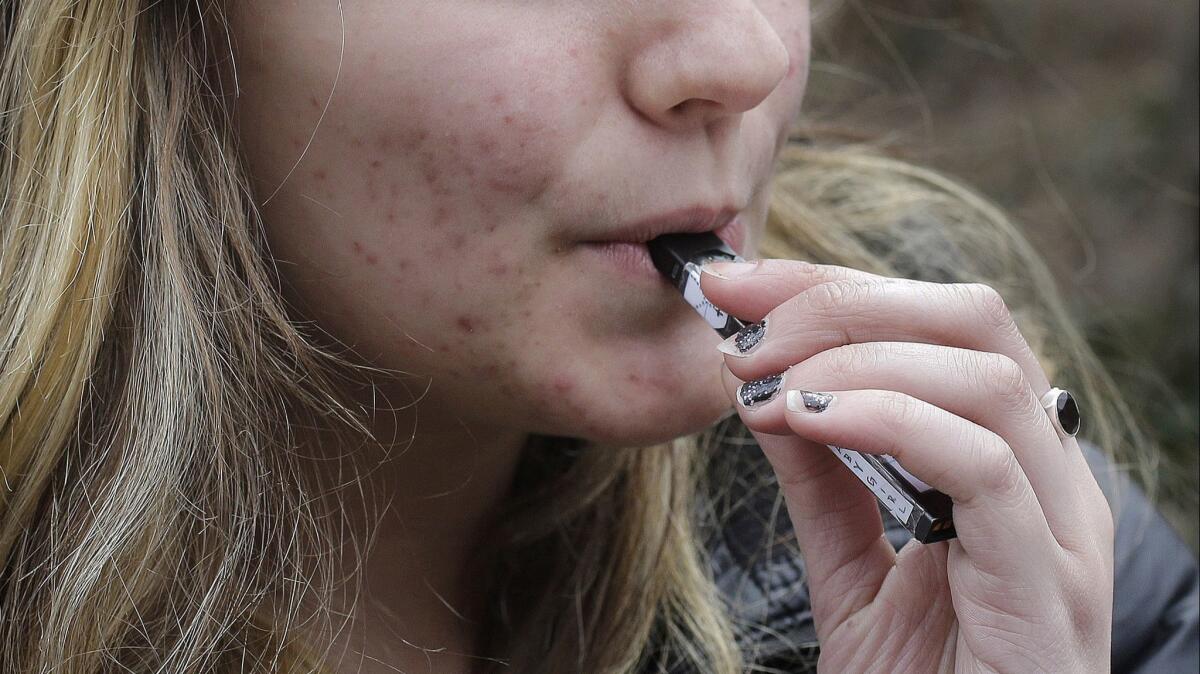Proposed California ban on flavored tobacco products shelved by lawmakers

Reporting from Sacramento — A California bill to ban flavored tobacco products, aimed at reducing the use of electronic cigarettes by minors, was shelved Thursday after the author said it had been watered down so much with exemptions that it was now opposed by public health groups.
Under intense lobbying from the tobacco industry, a Senate panel amended SB 38 against the wishes of its author to exempt hookah products and some flavors that are commonly used in cigars and pipes.
State Sen. Jerry Hill (D-San Mateo) said he was abandoning the bill in light of what he called “hostile” amendments.
“I introduced Senate Bill 38 to protect young people from the dangerous health risks of tobacco products in any form and to prevent another generation from becoming addicted to nicotine,” Hill said in a statement. “The aim was to prohibit tobacco products with fruit, candy and other flavors that entice young people from being sold in stores. The amendments imposed on the bill erode those protections by creating unnecessary, harmful exemptions.”
The Senate Appropriations Committee required the amendments as a condition to send the bill to the Senate floor for a vote.
But the changes caused a coalition of former supporters, including the American Cancer Society Cancer Action Network, American Heart Assn. and American Lung Assn., to oppose the legislation.
Exempting hookah products, the groups said in a letter, sets “a terrible precedent and undermine[s] the foundation of the original legislation to protect youth, low income and minority communities from flavored tobacco.”
The health groups noted that water pipe smoke, like cigarette smoke, contains significant amounts of cancer-causing ingredients, such as arsenic, cobalt, chromium, lead and carbon monoxide, according to a report by legislative staff, and that using a water pipe was equivalent to smoking up to 10 cigarettes per day.
Hill said opponents seeking the exemption for hookahs argued that the bill raised concerns among communities for whom the use of flavored hookah tobacco is a cultural tradition.
“I find it hard to believe that use of gummy bear- and bubble gum-flavored tobacco in any form is a cultural tradition,” Hill said.
In originally supporting the ban on flavored products, backers cited a study this year by the Centers for Disease Control and Prevention that indicated e-cigarette use among high school students increased by 78% in the last year.
The health groups said 80% of youths who have used tobacco started with a product aimed to attract young people with added flavor, such as cotton candy, bubble gum and mango.
The bill was also opposed by e-cigarette maker Juul Labs, which said it has already taken steps to keep tobacco products out of the hands of underage consumers. The firm has suspended the distribution of mango, fruit, creme and cucumber-flavored products in stores, requiring purchases to be made online at a site that screens out underage buyers.
“We have taken aggressive action to combat underage use of our products, while preserving the opportunity for adult smokers to switch from combustible cigarettes, which contribute to 40,000 deaths per year in California,” said Ted Kwong, a Juul spokesman.
The Cigar Assn of America, Inc. said the measure is not necessary because there are already federal efforts to regulate flavored tobacco.
The American Cancer Society Cancer Action Network recently criticized the large campaign contributions provided to lawmakers in the time that the bill was under consideration.
Juul contributed $135,000 to campaigns since Jan 1, 2018, with several donations going to members of the Assembly Governmental Organization Committee, which recently shelved a similar bill in that house.
The Senate voted Thursday to approve a bill that would ban smoking in state parks and beaches, citing the threat of cigarettes to public health and the environment.
The measure restricts use of cigarettes and e-cigarettes in areas to be designated by parks officials. Persons caught smoking would be subject to a $25 fine.
Sen. Steve Glazer (D-Orinda) noted that former Gov. Jerry Brown had vetoed similar bills twice, but he said he is hopeful it will be signed by Gov. Gavin Newsom.
“Hopefully the third time will be the charm,” he said.
Sign up for our Essential Politics newsletter »
Twitter: @mcgreevy99
More to Read
Get the L.A. Times Politics newsletter
Deeply reported insights into legislation, politics and policy from Sacramento, Washington and beyond. In your inbox three times per week.
You may occasionally receive promotional content from the Los Angeles Times.










